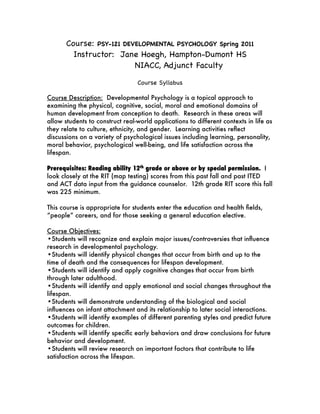
PSY-121 Developmental Psychology
- 1. Course: PSY-121 DEVELOPMENTAL PSYCHOLOGY Spring 2011 Instructor: Jane Hoegh, Hampton-Dumont HS NIACC, Adjunct Faculty Course Syllabus Course Description: Developmental Psychology is a topical approach to examining the physical, cognitive, social, moral and emotional domains of human development from conception to death. Research in these areas will allow students to construct real-world applications to different contexts in life as they relate to culture, ethnicity, and gender. Learning activities reflect discussions on a variety of psychological issues including learning, personality, moral behavior, psychological well-being, and life satisfaction across the lifespan. Prerequisites: Reading ability 12th grade or above or by special permission. I look closely at the RIT (map testing) scores from this past fall and past ITED and ACT data input from the guidance counselor. 12th grade RIT score this fall was 225 minimum. This course is appropriate for students enter the education and health fields, “people” careers, and for those seeking a general education elective. Course Objectives: •Students will recognize and explain major issues/controversies that influence research in developmental psychology. •Students will identify physical changes that occur from birth and up to the time of death and the consequences for lifespan development. •Students will identify and apply cognitive changes that occur from birth through later adulthood. •Students will identify and apply emotional and social changes throughout the lifespan. •Students will demonstrate understanding of the biological and social influences on infant attachment and its relationship to later social interactions. •Students will identify examples of different parenting styles and predict future outcomes for children. •Students will identify specific early behaviors and draw conclusions for future behavior and development. •Students will review research on important factors that contribute to life satisfaction across the lifespan.
- 2. Learning Activities: Lecture and discussion Case studies Video illustrations Individual and small group assignments Research Scheduled exams and announced and unannounced quizzes Comprehensive Final Exam Evaluation: Students will be evaluated on tests and quiz performances. 70% of grade: Test/quiz about every 2 weeks…40 points each. 20% of grade: Attendance/In-class assignments/discussions…10 pts every day In-class assignments and activities are completed periodically. These points may not be able to be able to made up. Exceptions are made for a school related activity (FFA field trip, College visit,..) 10% of grade: Online pretests….10 pts per pretest No extra credit work. Cell phones must remain in pockets, computer bags, or wherever and NOT be used (even to check the time...) during class! Cell phone use will result in a deduction for in-class work and they will be taken to the office, no question. Computers are to be used as a tool for educational purposes. If you are found on inappropriate sites that aren’t class related, points will be deducted for that class time. Detention time may also be assigned for inappropriate use. I expect all students to be prepared for class and to be in their seats preparing for class when the bell rings and remain seated until the bell rings at the end of the period. Bring textbook and computers to class daily for reference. Course Requirements: Attendance: Required. Generally, those will excessive absences tend to fail or do poorly. Assignments: Other assignments in class may be assigned and applied to the attendance/in-class assignments and discussion portion of the grade. Exams: 8-10 exams, approximately 40 pts each, will be given. Each exam will contain multiple choice items, with the possibility of a short answer essay
- 3. question. No student will be allowed to make up more than one exam, unless written documentation is provided (drs note or required school event away). NIACC: This is an official college course. The Hampton-Dumont High School is paying for your college credit. Disciplinary rules will be followed by NIACC’s policy on cheating. Text: A Topical Approach to Lifespan Development, 5th ed. John W. Santrock Online website for study and support: http://highered.mcgraw-hill.com/sites/0073370932/student_view0/index.html my email: jahoegh@gmail.com I’m using this email as the school email blocks some emails from getting to me.
- 5. Name: Email: Complete and Detach Initial as follows: _____ 1. I have received a copy of the syllabus. _____ 2. I understand the requirements for the course. Concerns or questions: